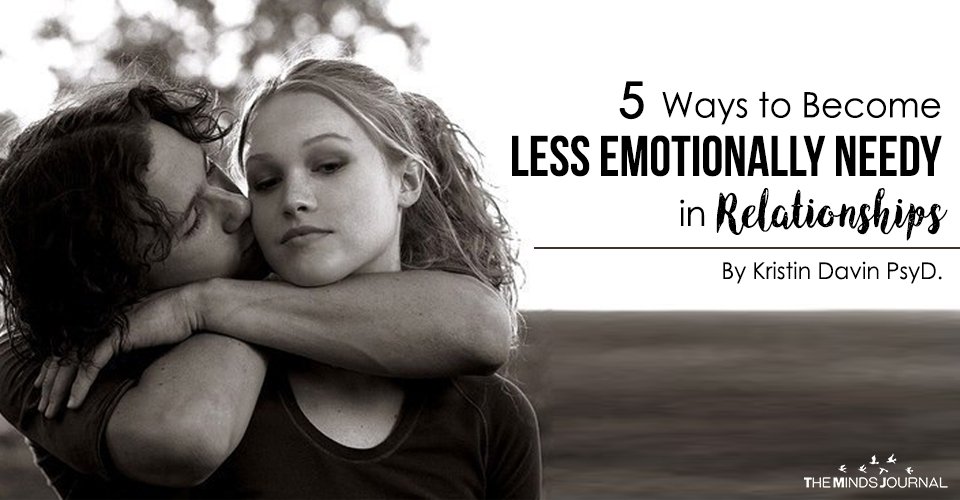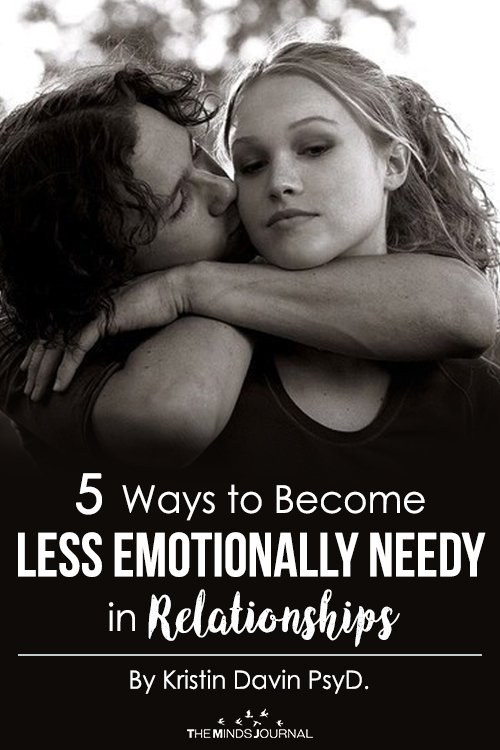How has needing someone or expressing your needs become such a bad thing? Is it so bad that we are hardwired to need people and feel connected? When we use the word ‘needed’ most people say, but I don’t want to seem needy.
However, feeling loved and needed is far from being needy.
But then again, feeling needed gets a bad rap. But, let’s set the record straight.
Being overly emotionally needy – too demanding, clingy, annoying, fragile – can spell disaster for your relationship.
Who want’s that? Being with someone who is excessively needy is excessively exhausting. Those relationships either burn out fast or take a slow burn and get to a place where a person feels suffocated. The need to run grows exponentially every day until, one day they run. They leave the relationship because they simply cannot keep up with the neediness or the demands of the other person. This is NOT being in a healthy relationship nor expressing your needs in a healthy way.
Being a healthy person means standing on your own, being able to tolerate aloneness, and manage your own ‘sh*t.
Simply put, that’s how healthy relationships thrive and grow. Our ability to express our needs and being independent inside of a relationship and thus creating an interdependent relationship is key. And our personality and attachment style – our style based on how we learned to relate to our parents and how emotionally available they were – is critical in our ability to express our needs in a healthy way and not create an overdose of neediness.
So, to understand the ‘neediness negative factor’ in relationships, it’s important to understand our attachment style. After all, first things first.
Three attachment styles: secure, anxious, and avoidant help create how secure or insecure we feel in relationships. Secure people present themselves as warm and loving and were most likely raised with caregivers that were consistently caring and responsive. Avoidant people often come across as dismissive, often minimize closeness and were raised in an environment that was less emotional and one in which insecurity and neediness were not tolerated.
Anxious people are the ones that present and who more often than not seen as overly needy. Some of the key characteristics are:
- They minimize or deny their needs and look to others to fill their emotional gaps and emptiness in a way that often becomes manipulative.
- They worry about their partner’s love and ‘search out’ for all the mannerisms and nuances that might indicate that their partner doesn’t love them.
They are often emotionally overwhelmed and will reach out and ‘need’ their partner more to make them feel secure or constantly remind them of how they feel. - They are insecure and overly sensitive to any slight.
They typically had parents (or a parent) who was inconsistently nurturing. This created inner angst and turmoil and contributed to their anxiety – especially around relationships.
For the partner? They feel emotionally tapped out and overwhelmed by their neediness. They are worn out. And yet, anxious people do the very thing they know they shouldn’t do – they push their partner away. But it’s like they cannot stop themselves. In their mind, they might be screaming, ‘stop doing this’, ‘don’t be so needy’, ‘don’t keep asking he/she the same question’. Their behaviors are very counterproductive, yet in the moment, it sounds like a good idea and feels so comforting – for them. However, their partner experiences something very different. What is their partner saying to themselves? RUN. RUN. RUN. Because no matter how much their try, it just isn’t enough. It never is. You cannot encourage growth, compliment them, or reassure them – enough. They have an insatiable and exhausting emotional ‘neediness.’
Not quite sure? Ask yourself these questions:
• Do you look at your romantic partner to make you happy?
• Do you look to your partner to fulfill all your needs in love, sex, and support?
• Do you look to your partner for constant reassurance and validation? Are you looking for others to make you feel good about yourself – always looking outside ‘self’ for reassurance? And even if you get it, do depend on it all the time? Do you feel abandoned if your partner is not available? Are you afraid your partner will not be there for you?
• Do you get upset if your partner doesn’t react in a certain way, doesn’t meet a need?
• If you are alone, do you do things to fill the void with other distractions? Or when alone, do you go over past conversations or worry that he/she might leave? Is it difficult to be alone?
• Is your relationship the center of your universe? What about your relationship with other friends or family? friends or your kids?
• Does it bother you if you are not included in your partner’s plans?
• Do you get jealous of things that he/she is doing without you?
How to Overcome Emotional Neediness
1.) Become aware
Awareness is the very first step to recognizing there is a problem. This is key. This starts the process of greater insight aware and understanding about how you relate to others. It will also help you recognize how your anxiety and anxious feelings occur and the greater impact they have on your relationships. Take the time and connect the dots with your past with your present. What is your attachment style? What would you like to change? How would you like to act differently? Answering these questions will help you recognize unhealthy relationship patterns.
2.) Sit with your anxiety and the uncertainties of life
This a tough one because people don’t like when they feel anxious. They want to do anything but deal with it. But truth be told, the only to solve an issue to work through it. There ain’t no going around it. Life is full of shades of gray, uncertainty, and unanswered questions. Uncertainty can also be an instigator for change. Even if in the moment it ‘feels like a good idea’, work on thinking about how you would feel if you didn’t do it. If you give into the anxiety and impulse every time, you will never know how it could be different (think OCD tendencies). If the impulse (obsessive thought is there) and you act on it (the compulsion) all you are really doing is creating the same circle and reinforcing the behavior. Sit with that anxiety and anxious feeling and don’t react!
3.) Don’t suffocate someone
No matter how close you are to another person, it is unhealthy to spend all of your time with him or her. They will feel overwhelmed and start to do things that back them out of the relationship. If it’s difficult for you to tolerate alone time, you will inevitably sabotage your relationship. Simply force yourself to back off in order to give both of you some space.
4.) Work on YOU!
Improve your self-esteem. If you struggle with being needy, odds are you probably lack self-esteem. Start doing things on your own, learn to be single, focus on yourself and what you did – or didn’t do – to contribute to the demise of the relationship. Engage in activities that are healthy for you and learn to feel more secure and confident. Remember – a person can boost up your esteem and make you feel good once in a while, but this is not their job. It is our responsibility to do that for ourselves. Another person cannot be your only source of happiness. That’s s a lot of pressure to put on another person.
5.) Learn to trust
Neediness is often associated with not trusting in others and often a fear of abandonment. If you start doubting someone’s feelings for you or fear being abandoned, you will start to put the ‘neediness’ wheels in motion – that actually provoke the person to want to run from the relationship. Do you feel abandonment? Are you afraid your partner will not be there for you? Are you looking for others to make you feel good about yourself – always looking outside ‘self’ for reassurance?
True non-neediness begins when you stop depending on others to take care of you and seeking fulfillment externally – because doing this, only creates a black hole of never having enough. Ask yourself, what do I need to do to become more self-reliant and independent? What changes do I need to make to get me to a better and healthier place?
After all, at a very minimum, don’t you owe it to yourself? Shouldn’t you demand more for yourself? Don’t you want to live your best life possible?
Written by
Kristin M. Davin, Psy.D.
Solution Focused Psychologist & Coach
Originally appeared on KristinDavin.com
You may also like
Is This Love or Emotional Dependency?
What It Means When You Keep Breaking Up And Getting Back Together









Leave a Reply
You must be logged in to post a comment.